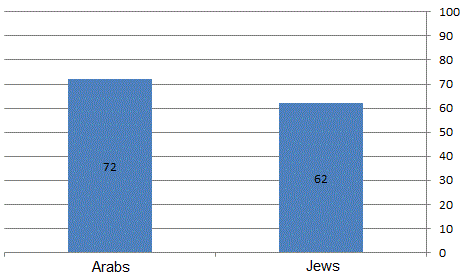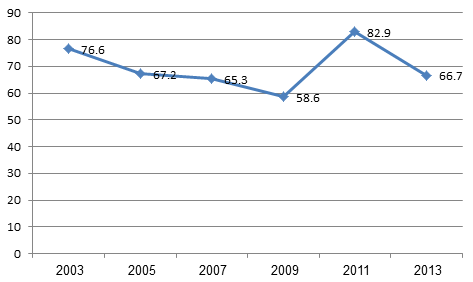Basic Law: Referendum—Changing the Rules of the Game of Israeli Democracy
Dr. Dana Blander draws on the findings of Israeli public opinion polls and explores some of the ramifications of the new Basic Law: Referendum, a law that establishes a system in which every citizen—regardless of religion, nationality, race, or gender—is entitled to participate in historic decisions on withdrawal from territory.

Photo courtesy of Shutterstock
Introduction
On March, 12, 2014, the Knesset approved Basic Law: Referendum. According to this new Basic Law, a referendum will be conducted if the Israeli government adopts a decision or signs an agreement stipulating that the laws, jurisdiction, and administrative authority of the State of Israel will no longer apply to a certain geographical area. In other words, the law will apply in the event of an agreement or unilateral decision that involves withdrawal from any territory.
Under the new Basic Law, no referendum will be necessary if the government's decision or agreement is ratified by over 80 members of Knesset. If a smaller Knesset majority (i.e., between 61 and 80 members) supports the agreement or decision, it would be put to a referendum. Anyone who is eligible to vote in Knesset elections would be entitled to participate in the referendum. The bill also includes a stability provision that excludes the law from the possibility of modification by emergency regulations. It also includes an entrenched clause that stipulates that the law can only be amended by another Basic Law that has the support of a Knesset majority.
It is important to note that the Eighteenth Knesset already passed a Referendum Law [Procedures of Government and Justice (Annulment of the Applicability of Law, Jurisdiction, and Administration) (Amendment) 5770–2010]. This law, which is still in effect, provides a detailed description of the procedures for conducting a referendum and includes instructions for the publication of the agreement that has been made, the phrasing of the question to be approved, laws regulating campaign propaganda, etc.
The initiative to entrench a referendum on territorial withdrawal in a Basic Law was connected to a petition submitted to the High Court of Justice, which challenged the constitutionality of the Referendum Law of 2010 on the grounds that it effects significant constitutional changes but still has the status of a regular law. The fact that there were ongoing negotiations with the Palestinians accelerated the initiative to enact this Basic Law.
While it was certainly appropriate to try to anchor a referendum in a Basic Law because it fundamentally changes the existing procedures of governance, the debate that took place prior to the passage of this law, conducted in response to immediate concerns, raised doubts about the manner in which the possibility of using the referendum mechanism and the ramifications of a referendum for Israeli democracy have been explored.
Israeli Public Opinion on Referendums
The findings of public opinion polls shed light on Israeli public support for a referendum. The most surprising finding is that there is widespread support among Arabs in Israel—and not only Jews—for holding a referendum in the event of a peace agreement with the Palestinians (see Figure 1). In general, a majority of the public prefers that the decision be made by referendum and not by the Knesset—a finding that reflects a lack of confidence in the Knesset.
Figure 1: A Referendum Should be Held if an Agreement is Approved
(Percentage of agreement, by nationality)

Source: The Peace Index, July 2013
It is possible that the unexpected finding that the Arab sector supports a referendum (although its elected representatives in the Knesset have come out against the idea) is because the Arab public may see participation in a referendum as a historic opportunity to be an equal and legitimate partner in a fateful decision and believes that it would have greater impact in a referendum than through its representatives in the Knesset. In fact, Arab citizens of Israel comprise 15% of all eligible voters, but only 9% of Knesset members are from the Arab parties. Thus, if Arab voter turnout in a referendum were to be high, it might be true that the referendum mechanism would give the Arab voters a greater say in the decision.
This may be why these polls also detect a worrisome trend: Many Jews (49%) believe that the concept of a referendum, which is called “a poll of the people” in Hebrew, includes only the Jewish people (Peace Index, July, 2013). In another study (Israeli Democracy Index, 2013), it was found that some 40% of respondents who identify themselves as right-wing or moderately right-wing support a referendum of Jews only, as do some 30% of respondents who identify themselves as centrist. (Only 10%–13% of respondents on the left and moderate left support this position.) When the Jewish respondents are segmented by religious observance, around 40% of the National Religious/National Haredi (ultra-Orthodox) population supports a referendum solely for Jews, as do 30% of Traditional Jews and about 30% Haredi Jews. Among Haredim, 44% believe that the decision should be made by rabbis and halakhic authorities, rather than by elected officials or the public (Israeli Democracy Index, 2013).
These findings are in keeping with the consistent findings of the annual Israeli Democracy Index, in which a large majority of the Jewish population indicates that it believes that important decisions require a Jewish majority (see Figure 2).
Figure 2: Fateful Decisions Related to Peace and National Security Should Require a Jewish Majority
(Agree somewhat or absolutely; Jewish sample; by year; percent)

Source: The Israeli Democracy Index 2013, p. 55
Although the proposed Basic Law and the existing law both stipulate that every Israeli citizen eligible to vote in national elections will be permitted to vote in a referendum, the view that a referendum will be considered legitimate only if the result reflects a Jewish majority is liable to undermine the very purpose of this tool, which is to grant public legitimacy to any decision that is made. And indeed, in a recent survey, 35% of right-wing voters said they will act against a peace agreement even if it is approved by a referendum. The same view was also supported by about a third of the Arabs (Peace Index, February, 2014).
Summary: Would a Referendum Preserve National Unity?
The finding that nearly half of the Jewish sector supports a referendum “for Jews only” suggests that the adoption of decision-making mechanisms in a democratic system can be a double-edged sword. A referendum, like other democratic mechanisms (such as elections) can have different repercussions, depending on the political system and political culture in which it is employed (see, for example, the failed experiment of having direct elections of the prime minister). According to the bill’s sponsors, the goal of requiring a referendum is “to preserve national unity.” We should be aware, however, that it could have exactly the opposite effect in Israeli society as a whole, given the exclusionary tendencies found in Israel's Jewish population.
At this stage, it is difficult to know what implications referendums would have for various aspects of the Israeli political system and Israeli political culture (e.g., the status of the Knesset, calls to use referendums to ratify other decisions, and delegitimization of the results of a referendum because of the make up of the majority). These, of course, would naturally depend on the outcome of the vote. The ramifications of a referendum that affirms the position of the government and Knesset would be different than the ramifications of a referendum that overrules a decision by Israel's representative institutions. In any case, for the sake of Israeli democracy, as soon as the referendum mechanism becomes an effective part of the constitutional toolbox, efforts must be made to explain the process to the public and make the public aware of the inherent value of a referendum, a system in which every citizen—regardless of religion, nationality, race, or gender—is entitled to play a part in historic decisions. Only if we internalize this principle as part of our political culture will the results of a referendum enjoy widespread legitimacy in the eyes of the public.
- Tags:
- Arab Society,
- Civil Liberties,
- Right to Equality,
- Judaism and Democracy,
- Legislation,
- Minorities,
- Religion and State,
- Rule of Law,
- Surveys and Polls,
- referenda,
- Arab citizens of Israel,
- Arab-Jewish relations,
- Basic Law: Referendum,
- Basic Laws,
- Citizenship,
- Civil society,
- Electoral Reform,
- equality,
- Israeli Democracy Index,
- Israeli political system,
- Israeli society,
- Jewish identity,
- Judaism and/vs. Democracy,
- Knesset,
- Legislation
